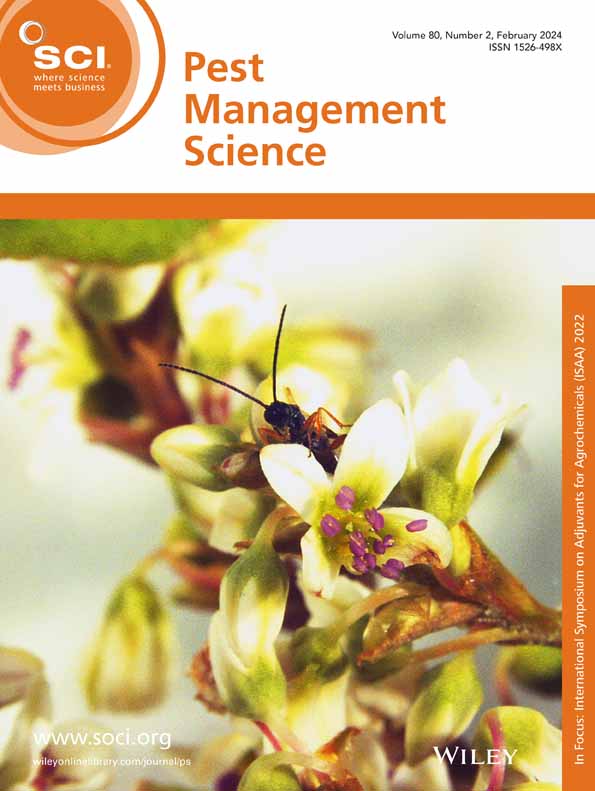Antimicrobial activity and mechanism of the plant-derived compound evodiamine against Phytophthora capsici.
IF 3.8
1区 农林科学
Q1 AGRONOMY
引用次数: 0
Abstract
BACKGROUND Phytophthora capsici is a devastating oomycete pathogen with major economic concern. However, the use of traditional chemical fungicides is associated with environmental pollution, and fungicide resistance is increasingly prevalent. Consequently, developing safe, effective, and environmentally friendly alternatives is critically required. Evodiamine (EVO), a bioactive alkaloid from plants, has been extensively investigated for its anti-cancer properties. However, its inhibitory effects against phytopathogens have not yet been fully elucidated. This study evaluated EVO's antimicrobial activity toward P. capsici and its potential mode of action. RESULTS EVO significantly inhibited P. capsici mycelial growth and spore germination, with median effective concentration (EC50) values of 6.48 μg mL-1 and 7.13 μg mL-1 respectively, across 108 P. capsici isolates. EVO exerted its antimicrobial effects by disrupting the cellular integrity of P. capsici, specifically targeting both the cell membrane and wall. Furthermore, EVO exhibited strong protective and curative efficacies in pepper leaves and seedlings. Genome-wide transcriptional analysis revealed that EVO treatment significantly altered the gene expression profile of P. capsici, especially affecting genes relevant to cell membrane integrity and transporter activity. CONCLUSION Overall, this study revealed that EVO showed great control efficacy against P. capsici and held promise as a novel botanical fungicide. © 2025 Society of Chemical Industry.植物源化合物evolodiamine对辣椒疫霉的抑菌活性及机理研究。
辣椒疫霉(phytophthora capsici)是一种具有破坏性的卵菌病原体,具有重要的经济意义。然而,传统化学杀菌剂的使用与环境污染有关,杀菌剂耐药性日益普遍。因此,开发安全、有效和环保的替代品是至关重要的。evoldiamine (EVO)是一种来自植物的生物活性生物碱,因其抗癌特性而受到广泛的研究。然而,其对植物病原菌的抑制作用尚未完全阐明。本研究评价了EVO对辣椒疫病菌的抑菌活性及其潜在的作用方式。结果tsevo对108株辣椒病原菌菌丝生长和孢子萌发均有显著抑制作用,平均有效浓度(EC50)分别为6.48和7.13 μ mL-1。EVO通过破坏辣椒辣椒的细胞完整性来发挥其抗菌作用,特异性地针对细胞膜和细胞壁。此外,EVO对辣椒叶片和幼苗均有较强的保护和治疗作用。全基因组转录分析显示,EVO处理显著改变了辣椒辣椒的基因表达谱,特别是影响了与细胞膜完整性和转运蛋白活性相关的基因。结论本研究表明,EVO对辣椒疫病具有良好的防治效果,有望成为一种新型的植物性杀菌剂。©2025化学工业协会。
本文章由计算机程序翻译,如有差异,请以英文原文为准。
求助全文
约1分钟内获得全文
求助全文
来源期刊

Pest Management Science
农林科学-昆虫学
CiteScore
7.90
自引率
9.80%
发文量
553
审稿时长
4.8 months
期刊介绍:
Pest Management Science is the international journal of research and development in crop protection and pest control. Since its launch in 1970, the journal has become the premier forum for papers on the discovery, application, and impact on the environment of products and strategies designed for pest management.
Published for SCI by John Wiley & Sons Ltd.
 求助内容:
求助内容: 应助结果提醒方式:
应助结果提醒方式:


